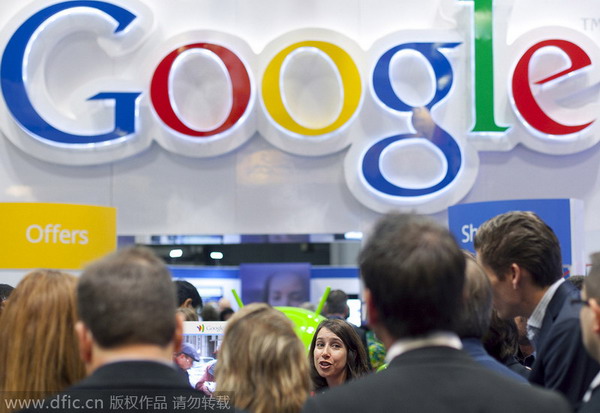Google teams up with 3 wireless carriers to combat Apple Pay
Updated: 2015-02-24 11:34
(Agencies)
|
|||||||||||
 |
|
Attendees at the National Retail Federation listen to a discussion about Google Wallet, in New York, Jan 17, 2012. File Photo / IC |
Aiming to undercut Apple's latest hit service, Google is teaming up with three major US wireless carriers to prod more people into using its mobile wallet.
The counterattack announced Monday is just the latest example of how the competition between Google Inc and Apple Inc is extending beyond the technology industry's traditional boundaries. Besides payments, Silicon Valley's two richest companies are expanding into fields such as home appliances and cars to increase their power and profits.
Google's latest volley calls for its payment service to be built into Android smartphones sold by AT&T Inc, Verizon Wireless and T-Mobile USA later this year. Smartphone owners currently have to download the service, called Google Wallet, and install the app on their phone if they want to use it to buy something instead of pulling out cash or a credit card.
Apple's rival service, Apple Pay, already comes embedded in the latest versions of the company's mobile software.
Besides trying to make it more convenient to use Wallet, Google also is hoping to improve the nearly 4-year-old service. Toward that end, Google Inc is buying some mobile payment technology and patents from Softcard, a 5-year-old venture owned by the wireless carriers. Financial terms weren't disclosed.
Although Google and the wireless carriers got a head start with their digital wallets, the concept hadn't gained much traction until Apple Pay debuted last fall.
The service has become more popular than Apple expected, according to a recent presentation by CEO Tim Cook.
Just three months after Apple Pay's November debut, Cook said the service accounted for two out of every three dollars spent across the three major US card networks, when no card was used. About 2,000 banks and credit unions have agreed to offer Apple Pay to its customers. Apple hasn't said how many merchants are set up to handle its mobile payment services.
If Apple builds on that early momentum, the Cupertino, California, company could become the leader in what is expected to be a booming market. Nearly 16 million US consumers spent about $3.5 billion on tap-and-pay services last year, according to the research firm eMarketer. By 2018, eMarketer predicts those figures will rise to 57 million US consumers spending about $118 billion.
Companies that provide mobile wallets make money by collecting processing fees from merchants and banks.
Samsung Electronics, another major smartphone maker, may be ready to join the fray after buying a mobile payment startup called LoopPay. That deal, announced last week, fueled speculation that Samsung will include a digital wallet on its next phone.
Apple Pay's popularity probably helped forge the unlikely alliance between Google and the wireless carriers. Google traditionally has had a prickly relationship with the carriers, largely because it doesn't believe enough has been done to upgrade wireless networks and make them cheaper so more people can spend more time online. Media reports say Google is considering selling its own wireless plans to consumers.
The pre-installation of the Wallet app is similar to what Google already does with its search engine, Gmail and YouTube on millions of other phones running on Android - an operating system that Google has been giving away for years to ensure people keep using its products on mobile devices. Google profits from the traffic by showing ads.
Today's Top News
Prince William starts Japan tour on culture exchanges
Volvo Group stalls in Q4 as construction sector contracts
Ukraine starts heavy weapons withdrawal
British deputy PM hosts Chinese New Year Reception
Effect of 'new normal' expected to be hot topic
Most Chinese forced to return home were living abroad illegally
Why China's youth is getting the needle
Prince William to visit China in March
Hot Topics
Lunar probe , China growth forecasts, Emission rules get tougher, China seen through 'colored lens', International board,
Editor's Picks

|

|

|

|

|

|





